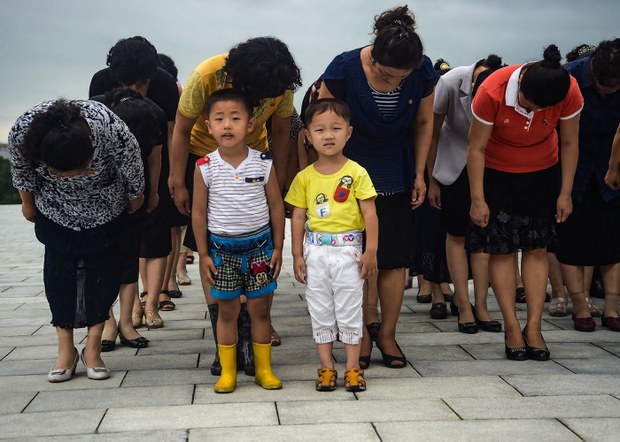For Int’l Women’s Day, North Korean women urged to bear more children for army
Share

Residents of Pyongyang, North Korea, bow before the statues of presidents Kim Il Sung and Kim Jong Il on Mansu Hill on the 23rd anniversary of Kim Il Sung’s demise in Pyongyang on July 8, 2017.
In honor of International Women’s Day, North Korean women have been urged to bear more children who will grow up to serve in the nearly 1-million strong Korean People’s Army – praised as an act of the “greatest patriotism,” sources in the country told Radio Free Asia.
The message has come in a series of ideological lectures for housewives, a resident in the northeastern province of North Hamgyong said on condition of anonymity to speak freely.
“Last week, a lecture was held on active support for the People’s Army, saying that having many children and sending them to the People’s Army is the greatest patriotism,” the source said.
A second source, based in the northern province of Ryanggang, said the lectures held up legendarily fertile women as the greatest example of patriots.
“They introduced some patriots who sent seven or eight of their kids to the military as an example,” the Ryanggang resident said. “The lecturer emphasized the need to have a patriotic spirit that puts the needs of the country ahead of the family, like these women have.”
But the lectures may really have been aimed at collecting donations from housewives to support the military, the Ryanggang source said.
“In our current difficult living situation, how many citizens can provide material support?”
Manpower – and womanpower
The North Korean military makes up for its lack of advanced technology through sheer numbers.
Compared to the more prosperous and democratic South’s 555,000 military personnel who are equipped with modern weaponry, North Korea has 1.15 million personnel in all its military branches, and many are using equipment that sometimes dates back to the Soviet era.
To maintain such large numbers, every able-bodied North Korean man must serve seven or eight years in the military, and women are strongly encouraged to join for up to five years. The number of enlisted women has been increasing recently due to a shortage of enlisted men in recent years.
The recent lectures also dedicated a lot of time to highlighting historical women who worked to support soldiers in wartime, the North Hamgyong source said.
“The lecture said that all women should learn from the patriotic spirit of the Namgang village women who supported the front lines in the 1950s,” said the second source.
During the 1950-1953 Korean War, women from the small village in the eastern province of Kangwon are said to have shuttled ammunition and food to North Korean soldiers fighting nearby. Their exploits were lionized in film to the point that they are now held up as one of the chief examples of female patriotism.
Rewarded with trip to Pyongyang
These days, North Korea’s most patriotic women – presumably those who have sent many children to the military – are honored with a trip to Pyongyang, according to the North Hamgyong source. The lecture explained that the country’s leader Kim Jong Un publicly promised he would personally invite active supporters to be special representatives to important military celebrations.
These included the 75th Army Foundation Day events that were held in mid-February, and in July, the anniversary of the 1953 armistice that ended hostilities in the Korean War, which the North calls the “Day of Victory in the Great Fatherland Liberation War.”
The lecture recapped how Kim welcomed the patriots in February, the source said.
“Kim Jong Un met with them and took commemorative photos,” the source said. “He also had them visit various places in Pyongyang, and benevolently gave them the opportunity to rest at the Yangdok Hot Spring Resort.”
Additionally, the lectures said that each city, county and province is supposed to register people as “military support enthusiasts.”
In some cases, the Central Committee of the Korean Workers’ Party will choose outstanding contributors as enthusiasts, the source said, adding that the objective is to create a social atmosphere that is conducive to military support.
Translated by Claire Shinyoung Oh Lee and Leejin J. Chung. Edited by Eugene Whong and Malcolm Foster.







